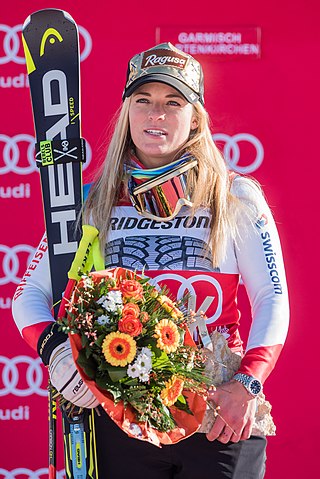This article needs additional citations for verification .(February 2023) |
| 1991 Women's downhill World Cup | |
| Previous: 1990 | Next: 1992 |
Women's downhill World Cup 1990/1991
This article needs additional citations for verification .(February 2023) |
| 1991 Women's downhill World Cup | |
| Previous: 1990 | Next: 1992 |
Women's downhill World Cup 1990/1991
| Round [1] | Race No | Place | Country | Date | Winner | Second | Third |
|---|---|---|---|---|---|---|---|
| 1 | 3 | Altenmarkt | December 8, 1990 | | | | |
| 2 | 6 | Morzine | December 21, 1990 | | | | |
| 3 | 9 | Bad Kleinkirchheim | January 6, 1991 | | | | |
| 4 | 15 | Méribel | January 18, 1991 | | | | |
| 5 | 17 | Garmisch-Partenkirchen | February 8, 1991 | | | | |
| 6 | 20 | Furano | February 24, 1991 | | | | |
| 7 | 22 | Lake Louise | March 9, 1991 | | | | |
| 8 | 25 | Vail | March 15, 1991 | | | | |
| 9 | 26 | Vail | March 16, 1991 | | | |
In women's downhill World Cup 1990/91 all results count. [2]
bold indicate highest score - italics indicate race wins
| Place | Country | Total Points | 3 | 6 | 9 | 15 | 17 | 20 | 22 | 25 | 26 | Racers | Wins |
|---|---|---|---|---|---|---|---|---|---|---|---|---|---|
| 1 | 414 | 64 | 42 | 33 | 53 | 44 | 46 | 49 | 32 | 51 | 9 | 5 | |
| 2 | 204 | 38 | 42 | 51 | 28 | 7 | 16 | 12 | 10 | - | 7 | 2 | |
| 3 | 182 | 9 | 20 | 15 | 17 | 26 | 25 | 21 | 24 | 25 | 5 | 2 | |
| 4 | 128 | 15 | - | 12 | 1 | 16 | 25 | 26 | 21 | 12 | 4 | 0 | |
| 5 | 125 | 10 | 18 | 17 | 27 | 26 | 3 | 3 | 10 | 11 | 4 | 0 | |
| 6 | 121 | 2 | 16 | 11 | 3 | 17 | 23 | 27 | 12 | 10 | 3 | 0 | |
| 7 | 59 | - | - | - | - | - | - | - | 30 | 29 | 5 | 0 | |
| 8 | 10 | - | - | 1 | 9 | - | - | - | - | - | 1 | 0 | |
| 9 | 2 | - | - | - | - | 2 | - | - | - | - | 1 | 0 |
| Alpine skiing World Cup | |
| Women | |
Overall | Downhill | Super-G | Giant slalom | Slalom | Combined | |
| 1991 |

The International Ski and Snowboard Federation, also known as FIS, is the highest international governing body for skiing and snowboarding. It was previously known as the International Ski Federation until 26 May 2022 when the name was changed to include snowboard.

The FIS Alpine Ski World Cup is the top international circuit of alpine skiing competitions, launched in 1966 by a group of ski racing friends and experts which included French journalist Serge Lang and the alpine ski team directors from France and the USA. It was soon backed by International Ski Federation president Marc Hodler during the FIS Alpine World Ski Championships 1966 at Portillo, Chile, and became an official FIS event in the spring of 1967 after the FIS Congress at Beirut, Lebanon.

Downhill is a form of alpine skiing competition. Whereas the other alpine skiing events emphasize turning and technique, downhill emphasizes "the six components of technique, courage, speed, risk, physical condition and judgement", according to the FIS "International Ski Competition Rules (ICR)". Speeds of up to 130 km/h (81 mph) are common in international competition. Athletes must have an aerodynamically efficient tuck position to minimize drag and increase speed.
Hartmann "Harti" Weirather is a former World Cup alpine ski racer from Austria. Born in Reutte, Tyrol, he specialized in the downhill event.

Alpine skiing has been contested at every Winter Olympics since 1936, when a combined event was held in Garmisch-Partenkirchen, Germany.
The 39th World Cup season began in October 2004 in Sölden, Austria, and concluded in March 2005 at the World Cup finals in Lenzerheide, Switzerland. The overall winners were Bode Miller of the U.S. and Anja Pärson of Sweden.
The 25th World Cup season began in August 1990 in New Zealand, resumed in December, and concluded in March 1991 in the United States. The overall winners were Marc Girardelli of Luxembourg, his fourth title and Petra Kronberger of Austria. This was the first season following the reunification of Germany and the last before the dissolution of Yugoslavia.
The 24th World Cup season began in August 1989 in Australia and Argentina, resumed in November 1989 in the United States and concluded in March 1990 in Sweden. During this season, the Soviet Union's empire collapsed, leading to the reunification of East and West Germany, the dissolution of Yugoslavia and Czechoslovakia, and many other changes in Eastern Europe, which would have a significant effect on future World Cup seasons.
The 23rd World Cup season began in November 1988 in Austria and concluded in March 1989 in Japan. The overall champions were Marc Girardelli of Luxembourg and Vreni Schneider of Switzerland. Schneider established the record for victories in a World Cup season, winning a total of 14 races, surpassing the record of 13 established in 1978-79 by the great Swedish skier and three-time overall World Cup champion Ingemar Stenmark.
The 10th World Cup season began in December 1975 in France and concluded in March 1976 in Canada. Ingemar Stenmark of Sweden won the first of his three consecutive overall titles. Defending women's overall champion Annemarie Moser-Pröll, who had won five straight overall titles, missed the entire season so that she could care for her father, who was terminally ill with lung cancer. In her absence, Rosi Mittermaier of West Germany, a double gold medalist at the 1976 Winter Olympics, won the women's overall title.
Women's Super-G World Cup 1990/1991
Women's giant slalom World Cup 1990/1991
Men's downhill World Cup 1990/1991

Ilka Štuhec is a Slovenian World Cup alpine ski racer, focusing on the speed events of downhill and super-G. She was a three-time junior world champion in three different disciplines, and was the world champion in downhill in 2017 and 2019.

The International Ski Federation (FIS) Alpine Ski World Cup was the premier circuit for alpine skiing competition. The inaugural season launched in January 1967, and the 2018–19 season marks the 53rd consecutive year for the FIS World Cup.

The International Ski Federation (FIS) Alpine Ski World Cup, the premier circuit for alpine skiing competition, began in January 1967, and the 2019–20 season marked the 54th consecutive year for the FIS World Cup. As it had every year since 2006, the season began in Sölden, Austria in October. The season was supposed to end with the World Cup finals in March, which were to be held in Cortina d'Ampezzo, Italy for the first time since they began in 1993, but the finals were cancelled due to the COVID-19 outbreak in Italy.

The women's downhill in the 2022 FIS Alpine Skiing World Cup consisted of nine events including the finals. Defending champion Sofia Goggia of Italy, who won four of the five downhills in which she competed in 2020-21, continued her domination in 2021-22 by again winning four of the first five downhills. Goggia took a commanding lead in the discipline after American Breezy Johnson, who finished second in each of the first three downhills, missed the rest of the season with a knee injury. Goggia then suffered her own knee injury, including a broken bone and ligament tears, while training for the last downhill prior to the 2022 Winter Olympics, but she was able to continue competing within a month and, after all but the final race of the season, had such a commanding lead that only one other competitor even had a theoretical possibility of overtaking her. At the finals, Suter failed to score, and Goggia won her second consecutive discipline championship.

The International Ski Federation (FIS) Alpine Ski World Cup is the premier circuit for alpine skiing competition. The inaugural season launched in January 1967, and the 2022–23 season marks the 57th consecutive year for the FIS World Cup.

The women's downhill in the 2023 FIS Alpine Skiing World Cup consisted of nine events, including the final. The original schedule called for eleven events, but the first two races of the season scheduled for 5 and 6 November 2022 in Zermatt/Cervinia, were canceled due to adverse weather conditions; the FIS decided not to reschedule them. Once the season began, a downhill scheduled in St. Anton on 14 January had to be converted into a Super-G due to the inability to hold a pre-race training run on either of the two days prior to the downhill. However, a subsequent Super-G scheduled at Cortina d'Ampezzo was converted into a downhill, restoring the original schedule.

The women's super-G in the 2023 FIS Alpine Skiing World Cup included eight events, including the final. The original schedule called for nine events, but a scheduled downhill at St. Anton on 14 January was converted to a super-G due to the inability to hold pre-race practice runs on either of the two days prior to the event. A later super-G at Cortina was converted into a downhill to restore the original schedule balance, but then a downhill at Crans Montana on 25 February had to be delayed a day due to fog and dangerous course conditions, and the super-G previously scheduled for that day was cancelled and not rescheduled.